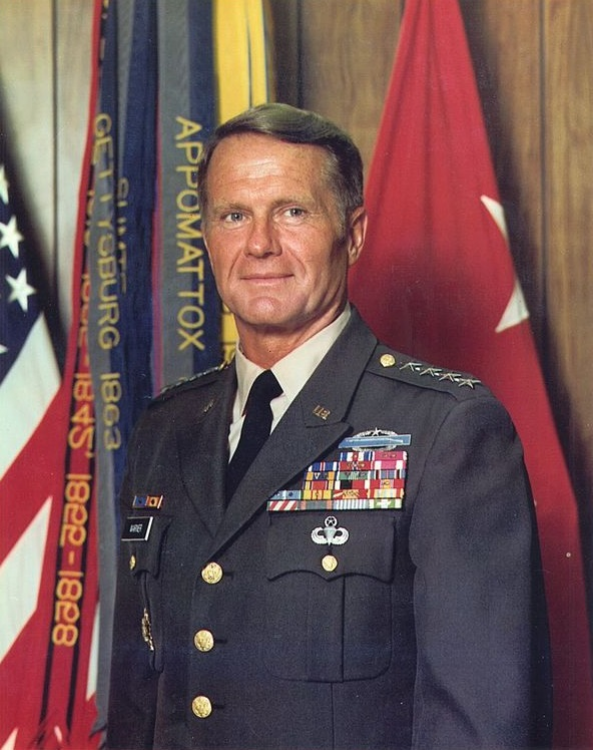
 |
|
|
||
|
Volney Frank Warner |
||||
|
Graduate, U.S. Military Academy, Class of 1950 Engagements: • Korean War (1950 - 1953)• Vietnam War (1960 - 1973) |
||||
| Biography: | ||||
|
Volney Frank Warner Volney Frank Warner was born on 7 June 1926 in Woonsocket, SD. He enlisted in the U.S. Navy in 1944 and then was transferred to the U.S. Army the following year upon receiving an alternate appointment from South Dakota to the U.S. Military Academy at West Point. Graduating in 1950, he was commissioned a Second Lieutenant in the Infantry. Almost immediately after graduation, he was ordered to Korea, where he served in combat as an Infantry platoon leader in Company L of the 21st Infantry Regiment, 24th Infantry Division. In 1953, Warner was reassigned to Europe where he served as a company commander and battalion staff officer in Trieste, Italy, Austria, and West Germany. Following attendance at the U.S. Marine Corps Advanced Course in Quantico, VA, Warner served a tour of duty at West Point as an instructor in the Department of Psychology and Leadership, after earning a Master of Arts Degree in Psychology from Vanderbilt University. In 1963, Warner was reassigned as a Province Senior Advisor in South Vietnam. After returning from Vietnam in 1965, he served in a variety of positions in Washington, DC, including duty as the Military Assistant to the Special Assistant to the President for Vietnam Affairs. After earning a Master's of Science in International Relations from George Washington University in 1969, Warner assumed command of the 3rd Brigade, 4th Infantry Division. Returning to the Pentagon in 1970, Warner served as the Executive Officer and Senior Aide to the Army Chief of Staff. In 1972, Warner was reassigned to the 82nd Airborne Division, first as the Chief of Staff and then as the Assistant Division Commander for Operations. After a tour of duty as the U.S. Army Forces Command (FORSCOM) Assistant Deputy Chief of Staff for Operations, General Warner assumed command of the 9th Infantry Division in 1975. Warner assumed command of the XVIII Airborne Corps in 1977. Commander in Chief, U.S. Readiness Command In 1979, Warner was appointed Commander-in-Chief, Readiness Command (REDCOM), headquartered at MacDill Air Force Base in Tampa, FL. His tenure as REDCOM commander coincided with the inter-service debate over which unified command should have jurisdiction over the Middle East and the associated Rapid Deployment Force. In 1980, the Rapid Deployment Joint Task Force (RDJTF) was created under the command of Marine Lieutenant General Paul X. Kelley and based at MacDill Air Force Base. During planning and training exercises in the U.S., the RDJTF reported to REDCOM, which was responsible for preparing U.S.-based Army and Air Force units for overseas deployment. But during operations, the force was controlled by whichever headquarters had oversight over the territory in which it was deployed. Since the RDJTF was expected to operate mainly in the Middle East, permanent operational control over the force implied geographical responsibility for Southwest Asia. At the time, no unified command was specifically responsible for that increasingly critical region, which was divided between U.S. European Command and U.S. Pacific Command. Warner opposed proposals to assign the RDJTF to either European or Pacific Command, or to allow the RDJTF to oversee the Middle East as an autonomous command. Instead, he asked that the land responsibility for Southwest Asia be returned to Readiness Command, which had overseen the Middle East and sub-Saharan Africa in its previous incarnation as U.S. Strike Command. Meanwhile, he insisted that as long as the RDJTF was headquartered in the U.S., REDCOM was its governing unified command and the RDJTF should not continue to bypass the REDCOM commander by maintaining an independent office in Washington, DC. The inter-service controversy over which unified command should control the RDJTF created friction between the REDCOM and RDJTF headquarters staffs and eventually spilled into the press, which cast the debate as a personal feud between Warner and Kelley. "Unfortunately, we were both caught up in the service argument as to whether it should be a premier Army or Marine force," Warner said. On 25 April 1981, Secretary of Defense Caspar Weinberger announced that the RDJTF would become a separate command with responsibility for Southwest Asia. Rebuffed in his attempt to renew the mandate of his command, Warner requested retirement, citing a lack of support from the Joint Chiefs of Staff during the debate. In parting, he observed that if the RDJTF were to be made an independent unified command, then REDCOM would be redundant and should be disestablished. The RDJTF became U.S. Central Command in 1983 and REDCOM was replaced by U.S. Special Operations Command in 1987. General Warner retired from the Army on 31 July 1981. Medals, Awards and Badges Defense Distinguished Service Medal Military and Advanced Education His military education includes the Command and General Staff College in 1963; Armed Forces Staff College in 1965; and the National War College in 1969, at which time he also received a Master of Science degree in International Relations from George Washington University. In Retirement After his retirement, Warner was Vice President of Applied Technology, Vertex Systems, Incorporated, and later established V.F. Warner and Associates, a Washington-based consulting firm. He resides in McLean, VA. Personal Life Warner married Belva Janice Forbes in 1950, and they had two daughters and two sons. One son is a retired Brigadier General and the other a retired Colonel. On 18 August 2005, Warner's granddaughter, First Lieutenant Laura Margaret Walker [Honoree Record ID 2208], was killed in action in Delak, Afghanistan, making her the first female USMA graduate to die in combat. Warner has since come out to publicly criticize the Iraq War, and proposes preemptive peace as an alternative to preemptive war for the future. |
||||
| Honoree ID: 354 | Created by: MHOH | |||
Ribbons
Medals
Badges
Honoree Photos
 |  |  |
 |  |
 |


